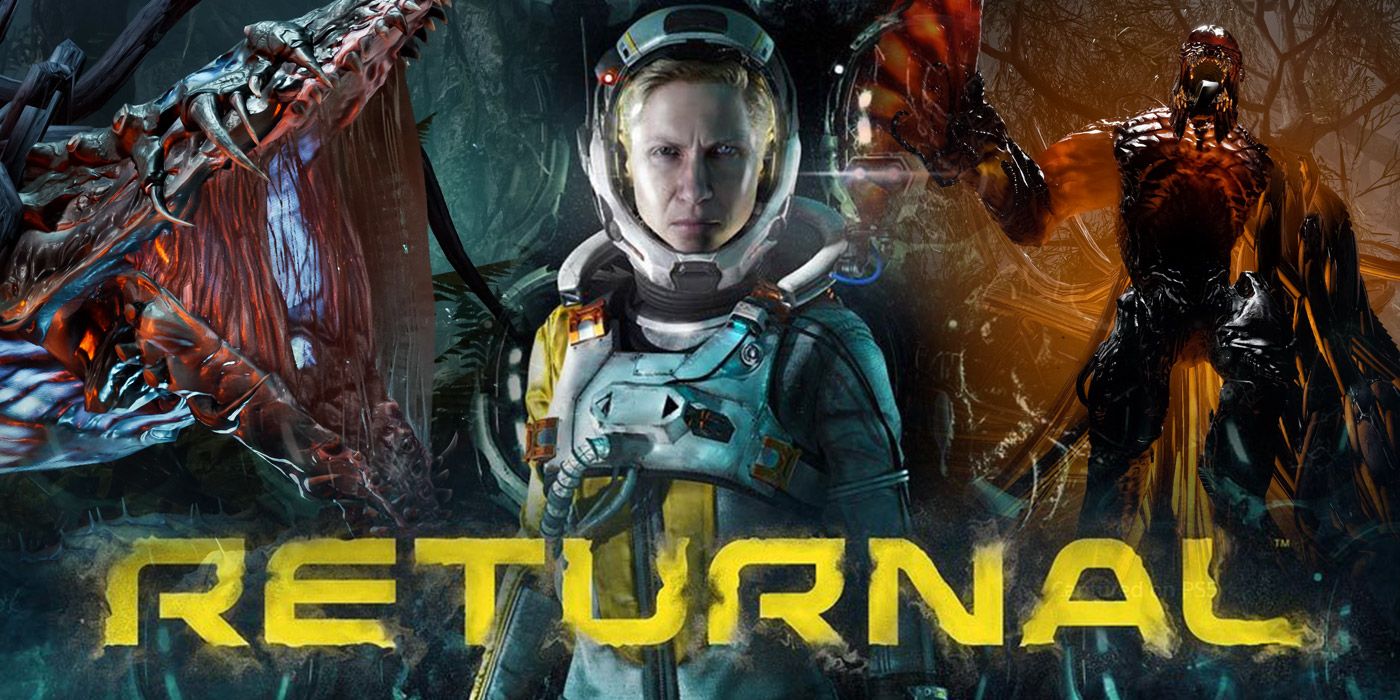Following its release in April of this year, Returnal received widespread praise for its challenging gameplay, striking visuals, and intriguing story. Publisher Sony was so impressed with the work of Finnish indie developer Housemarque on the game that it acquired the company two months later. While it has plenty going for it, the true secret of Returnal’s success could be that it is impossible to easily categorize.
The game sees players take the role of Selene, a space explorer who crash-lands on a remote and hostile world that resurrects her each time she dies, rearranging itself into a new layout every time the stricken astronaut attempts to brave its challenges and discover the secret of the mysterious ‘White Shadow’ broadcast that summoned her. Returnal’s time loop mechanic enables the game to follow a roguelike structure, with players returned to the start after each defeat so they can attempt to apply their increased understanding of the game’s systems to their subsequent playthrough.
What genre is Returnal?
Despite being ostensibly a roguelike or ‘roguelite’, Returnal is also a chilling psychological horror experience, with Selene shocked to find that the alien planet contains references to her own life and past back on Earth. The game’s combat is undoubtedly rooted in Housemarque’s experience as a developer of bullet hell shooters, but also contains elements of other third person action games such as Dark Souls.
The fact that Returnal seems to defy straightforward classification perhaps makes its success surprising. Gamers often like to know what experience they are going to get when they part with their hard-earned cash to buy a new AAA release, particularly one with Returnal’s hefty price tag of $70 at launch.
Indeed, this is the primary reason why genre labels exist: they’re a shorthand that helps players understand what experience a game is going to give them. ‘First-person shooter’ conveys clearly what sort of gameplay can be expected, as does ‘puzzle platformer’ or ‘beat ‘em up’. Returnal’s status as a ‘roguelite action RPG psychological horror bullet hell shooter’ might have been confusing enough to dissuade some fans from buying the PS5 exclusive.
Other developers have encountered similar difficulties when attempting to breach genre conventions. Ice Pick Lodge’s survival horror, medical simulator, first-person RPG, and philosophy art game Pathologic achieved cult status, prompting a sequel/remake in the form of Pathologic 2. But the poor sales performance of the latter upon release in 2019 means that the planned additional characters and storylines have never been released.
Why The Success of Returnal’s Genre Mash-Up Is Encouraging
Thankfully, despite being such a difficult game to pigeonhole, the success of Returnal has proven that there is still a market for games brave enough to break from traditional genre constraints. This might encourage other developers to push the boundaries of what can be achieved by combining elements from different types of video games.
Returnal is not the first game to combine critical recognition and strong sales by taking this approach. Portal and its sequel Portal 2 are examples of games that merged genres, in this case first-person shooter with puzzle platformer, and are regarded as all-time classics that fans would love to see resurrected in the shape of a new Portal game. Batman: Arkham Asylum is another example of an effective and successful mash-up, blending elements of Metroidvania with stealth, action, beat ‘em up and RPG genres.
The popularity of these games has also led to more recent attempts at fusing genres, including Arkane’s recent PS5 exclusive Deathloop, which combines FPS and roguelite elements. SuperMash on the Nintendo Switch even promises ‘a game that makes games’ by allowing players to select two different genres to mash together into countless combinations. It seems that the industry is recognizing the appeal and marketability of this game design paradigm, something that could end up resulting in games that are just as unique as Housemarque's Returnal.
However, this approach will not be successful if approached haphazardly, and if developers fail to effectively integrate disparate elements. The structure of Housemarque’s game works so well because its constituent parts complement each other within the context of the overarching narrative. Returnal’s masterful story gives players a clear reason to be exploring and blasting their way through the unwelcoming world of Atropos, as well as enfolding the psychological horror component into its ambiguous and mysterious tale. If another developer wants to replicate Returnal's success, keeping this in mind would undoubtedly be important.
Even Returnal’s core gameplay loop sees players’ feelings mirroring those of the protagonist. Unsure what to expect in early incursions into Atropos, players encounter disturbing creatures and hostile situations, as well as obtaining troubling fragments of information about the nature of their predicament. Feeling as fearful, uncertain, and powerless as Selene herself, they are nevertheless motivated to venture further into Atropos with each subsequent run, braving the planet’s horrors as they hone their skills with unfamiliar alien weaponry in search of more answers and Returnal’s true ending.
Despite incorporating so many influences and gameplay elements, every part of Returnal is calibrated to hang perfectly together. With Housemarque’s epic and other innovative mash-ups already enjoying success, time will tell whether other developers can create fulfilling experiences by combining multiple genres in creative ways.
Returnal is available now for the PS5.



.jpg)